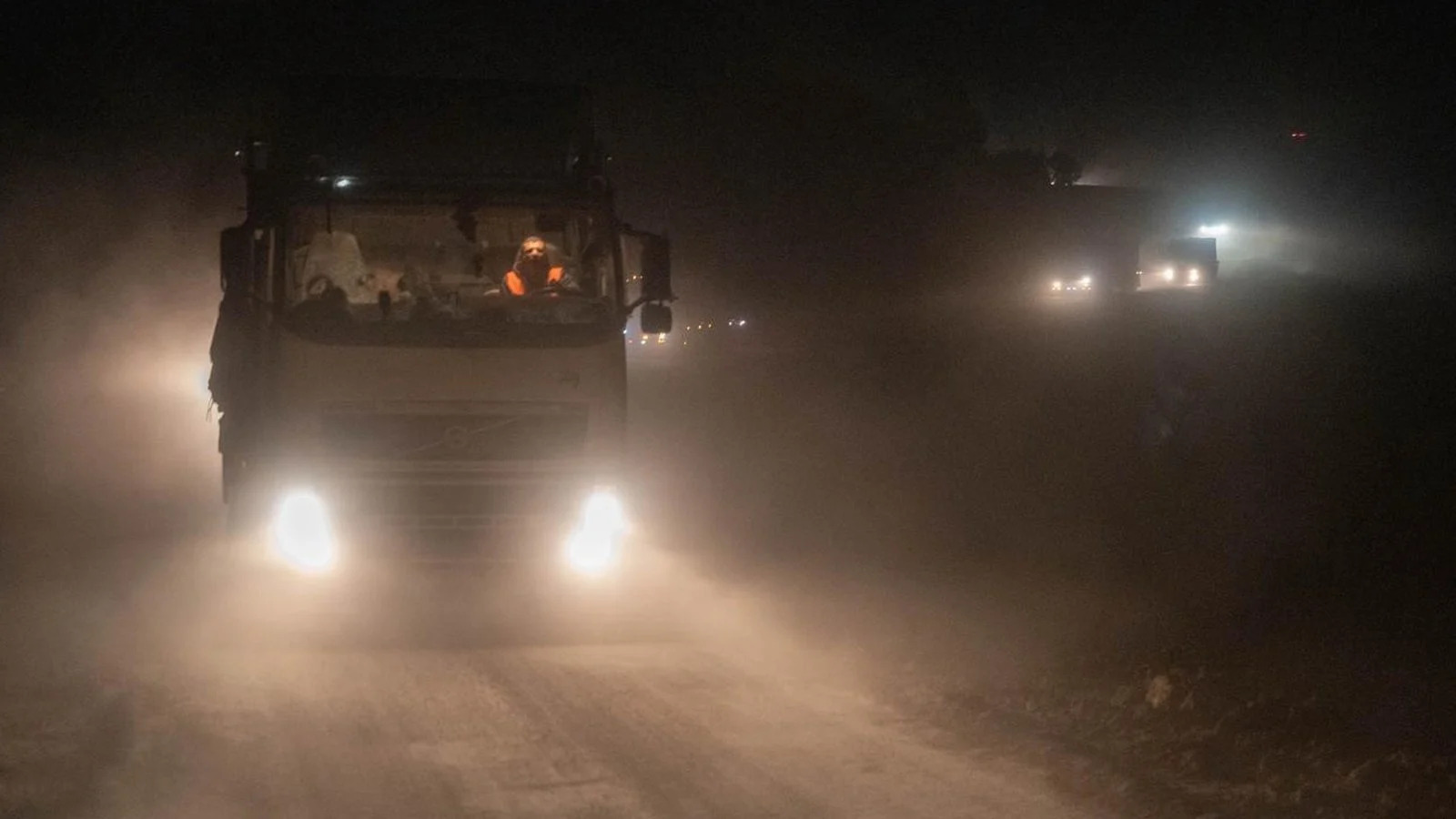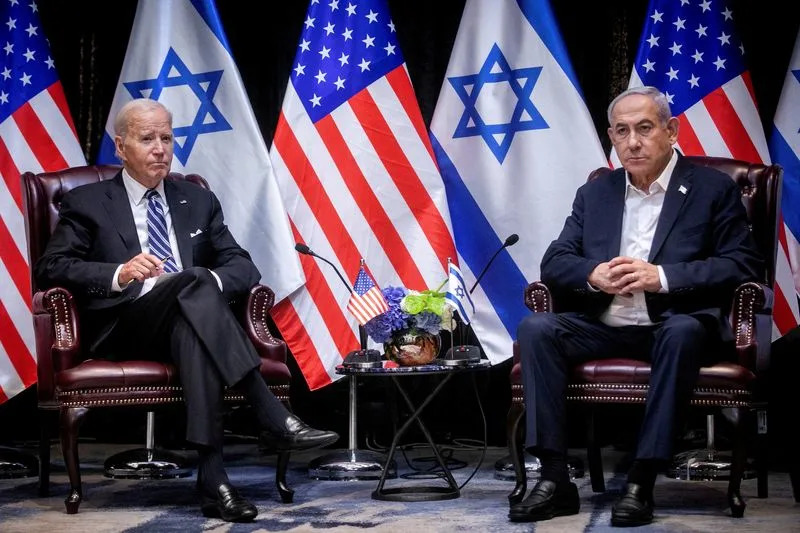Dangerous Hamas that caused the war with Israel still have inhuman attitude towards their own people. In the west people are joining in the protest in support of Hamas Palestinian terrorists.
Lorry loaded with humanitarian aid at the Rafah border crossing between Egypt and Gaza -
A Hamas-linked website warned Palestinians who assist Israel in providing aid to Gaza that their actions will not be “tolerated”.
Those who did would be treated as collaborators and be handled with an iron fist, the Hamas Al-Majd security website said on Monday, quoting a security official in Palestinian militant forces.
The warning came in response to reports that Israel was considering arming some Palestinian individuals or clans in Gaza to provide security protection for aid convoys into the besieged enclave as part of wider planning for humanitarian supplies after the fighting ends.

The Israeli prime minister’s office has declined to comment on the report, which came a week after dozens of Palestinians were killed in an incident in which crowds surrounded a convoy of aid trucks entering northern Gaza and troops opened fire.
“The occupation’s attempt to communicate with the leaders and clans of some families to operate within the Gaza Strip is considered direct collaboration with the occupation and is a betrayal of the nation that we will not tolerate,” the website said, quoting the official.
“The occupation’s [Israel’s] efforts to establish bodies to manage Gaza are a ‘failed conspiracy’ that will not materialise.”
With civil order increasingly strained in Hamas-run Gaza and police refusing to provide security to convoys because of the risk of being targeted by Israeli forces, the issue of secure distribution of desperately needed food and other supplies has become a big problem.
‘Compel Israel to open all land crossings’
Gaza has several large traditional family clans, affiliated with political factions including Hamas and Fatah, the rival group that dominates the Palestinian Authority in the occupied West Bank. Some of those clans are believed to be well armed and there has been no indication that they would consider working with Israel.
Responding to plans by the European Union and the United States to create a sea corridor to send aid ships to the enclave, Basem Naim, a senior Hamas official, said it was a “positive” step but the world should have rather acted to end the war.
“Ensuring all the needs of the population in the Gaza Strip are met is not a favour from anyone; it is a guaranteed right under international humanitarian law even during times of war,” he told Reuters, adding: “If the US administration is serious about solving the humanitarian crisis, the easiest and shortest path is to stop using veto power to allow a ceasefire to be reached, and to compel Israel to open all land crossings and allow entry of all required aid.”
UN aid convoy uses new land route from Israel to reach north Gaza
The UN says a new land route has been used to deliver food to northern Gaza for the first time in three weeks.
The Israeli military said six lorries from the World Food Programme crossed via a gate in the Gaza border fence.
Tuesday night's delivery was "part of a pilot to prevent Hamas from taking over the aid", it added.
It comes amid global pressure on Israel to allow more access to the Palestinian territory for aid amid a looming famine as it continues its war on Hamas.
A boat carrying 200 tonnes of food aid for distribution by a charity also set sail from Cyprus on Tuesday, inaugurating a new maritime corridor into the Palestinian territory. It is expected to arrive near Gaza on Thursday.
However, it has been widely pointed out that access by road remains the quickest way to get in urgently needed supplies.
The UN said the WFP convoy was able to use an Israeli military road that runs along the Gaza border fence to reach the north and deliver enough food for 25,000 people to Gaza City.
Israeli security officials carried out a prior security check on the aid lorries at the Kerem Shalom crossing with southern Gaza, according to the military.
The UN says at least 576,000 people in Gaza - one quarter of the population - are one step away from famine.
It warns that time is running out for the estimated 300,000 people who are isolated in the north of the territory, which UN agencies have struggled to access for several months due to Israeli restrictions, the ongoing hostilities and a breakdown of law and order.
Gaza's Hamas-run health ministry says at least 27 people, most of them children, have died as a result of malnutrition and dehydration at hospitals there.
Israel insists there are no limits to the amount of aid that can be delivered into and across Gaza and blames UN agencies for failing to distribute the aid to the people who need it.
As Gaza's humanitarian crisis deepens, Qatari and Egyptian mediators say they are continuing to push for a truce between Israel and Hamas.
The war began when Hamas gunmen attacked southern Israel on 7 October, killing about 1,200 people and seizing 253 hostages. More than 31,100 people have been killed in Gaza since then, the Hamas-run health ministry says.
Analysis-Biden-Netanyahu rift raises questions about US weapons to Israel
U.S. President Joe Biden meets Israeli Prime Minister Benjamin Netanyahu in Tel Aviv.
A deepening rift between President Joe Biden and Israeli Prime Minister Benjamin Netanyahu over Gaza red lines has set up a potential showdown between the two leaders and raised questions about whether the U.S. might restrict military aid if Israel goes ahead with a ground offensive in the south of the enclave.
Strains between Biden and Netanyahu have added momentum to discussions within the U.S. administration about how it could use its leverage to convince Israel to do more to facilitate humanitarian relief to Gaza and avoid further heavy Palestinian civilian casualties in its war against Hamas, U.S. officials say.
Biden's greatest source of leverage is the U.S. supply of weapons. He has resisted using it, despite Netanyahu’s defiant response to Washington’s entreaties and increased calls from some of the president’s fellow Democrats.
But with Biden showing mounting signs of frustration with Netanyahu, U.S. officials have not ruled out a possible shift in policy that could include putting conditions on military aid if Israel carries out its threatened invasion of Rafah in southern Gaza.
Biden’s 2024 re-election bid has complicated his efforts to craft strategy. Aides recognize that he needs to avoid giving Republicans an issue to seize on with pro-Israel voters, while also halting the erosion of support from some progressive Democrats dismayed by his strong backing for Israel.
Any decision by Biden, who has called himself a "Zionist," to get tough with Israel would run counter to his decades-old history as an ardent supporter of the country.
"No matter how you cut it, Biden is in a bind on how to deal with this crisis," said Aaron David Miller, a former Middle East negotiator for Republican and Democratic administrations.
There are no indications that any decisions have been made about restrictions on weapons supplies in the event of a Rafah invasion, which Biden has warned must not happen without an Israeli plan for protecting civilians there. More than half of Gaza’s population is sheltering in the Rafah area.
Biden may have hinted at his thinking in an MSNBC interview over the weekend when, after insisting a Rafah invasion would be a "red line," he said the defense of Israel is "critical" and there is no way "I’m going to cut off all weapons so that they don’t have the Iron Dome (missile defense system) to protect them."
Biden did not explicitly make such assurances about offensive weapons, adding to speculation in media reports that such arms could be included if he were to impose conditions on Israel, which relies heavily on U.S.-made equipment.
Any restrictions on offensive weapons could put Israel at greater risk if all-out war breaks out with Lebanese Hezbollah militants on its northern border or Iran, which backs both Hamas and Hezbollah, enters the conflict.
Asked about potential limits on weapons, U.S. national security adviser Jake Sullivan told reporters on Tuesday he would not engage in "hypotheticals" and that news reports about Biden’s thinking on the issue were “uninformed speculation.”
NETANYAHU DEFIANT
Dismissing Biden’s strident criticism to MSNBC in which he spoke of red lines and said Netanyahu was "hurting Israel more than helping," the Israeli premier has vowed to press forward with the military campaign in Rafah, the last part of the Gaza Strip where Israeli forces have not carried out a ground offensive.
“You know what the red line is? That Oct. 7 doesn’t happen again,” Netanyahu, who is known as Bibi and has had a long and often tense relationship with Biden, told Politico on Sunday.
Israel has made clear to the U.S. that it is prepared to withstand the international condemnation it had expected to face over its military response to Hamas' Oct. 7 attack, according to a person in Washington familiar with the matter. Israel, which accuses Hamas of using human shields, has insisted it takes precautions to minimize civilian casualties.
Fighters from Hamas, which rules Gaza, killed 1,200 people in their rampage five months ago into southern Israel and took 253 hostages, according to Israeli tallies. Israel's retaliatory military campaign has killed more than 31,000 Palestinians, according to health authorities in Gaza.
While U.S. officials have said there is no sign of an imminent assault on Rafah, Biden and his aides have issued repeated warnings about the need for Israel restraint there. European Union countries have said an attack would be "catastrophic."
Public messaging from the United States has sharpened since the deaths of more than 100 Palestinians earlier this month as they rushed to get food from an aid convoy in northern Gaza.
Irked over the slow pace of aid that Israel was allowing in by land, the Biden administration last week began airdrops of humanitarian supplies and announced plans to build a floating aid dock off the Gaza coast.
Washington has seen Israel slowly cooperating on humanitarian aid, but one U.S. official said progress had been incremental, adding: "It's pulling teeth on every little piece."
There have been closed-door conversations at the U.S. State Department on whether the U.S. should limit military aid to Israel, a second U.S. official said, but the idea has not received support from the senior leadership.
Most analysts said that given Biden's election-year considerations, he would be expected to tread very carefully in deciding whether to pressure Netanyahu by using weapons-related leverage or pulling back on U.S. diplomatic shielding of Israel at the United Nations Security Council.
The likely Republican presidential nominee, former President Donald Trump, would pounce on such moves as threats to Israel’s security.
The safer option for Biden would be to keep up his strategy of gradually distancing himself from Netanyahu, whose own approval ratings have plummeted among Israelis, while continuing his outreach to the Israeli people, where the U.S. president is popular.
The administration’s recent welcome to Washington of Israeli war cabinet member Benny Gantz, a centrist politician who U.S. officials hope will someday replace Netanyahu, was widely seen as a snub to the right-wing prime minister, who has yet to be invited to the Biden White House.
"Biden is performing a political amputation — cutting off Bibi to save the patient State of Israel," said Laura Blumenfeld, a Middle East analyst at the Johns Hopkins School for Advanced International Studies in Washington.





